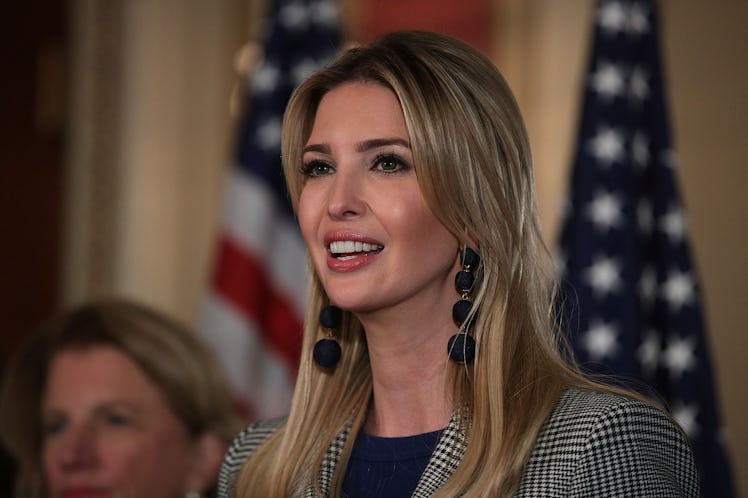
Ivanka Trump Gave A Speech On Sexual Harassment & People Brought Up The Obvious
During a speech delivered on Friday, Nov. 3, in Tokyo, Japan, Ivanka Trump spoke about sexual harassment of women in the workplace. For reasons all too obvious, the speech prompted responses that highlighted the uncomfortable and unfortunate irony of her message. Put simply, one could easily argue Trump's speech could be put to much better use at home more than abroad.
During the speech, Trump said, "all too often, our workplace culture fails to treat women with appropriate respect. This takes many forms including harassment which can never be tolerated."
Just a week prior to Trump's speech in Japan, sexual harassment claims made against President Donald Trump were a subject of discussion at the White House on multiple occasions. The claims were made by over a dozen women whose allegations were mostly reported just a month before the 2016 election, seemingly prompted by the revelation of a recording in which the president talked about groping women.
Last week, when one reporter raised the subject of accusations made against the president and whether the White House believes the accusing women are all lying, Press Secretary Sarah Huckabee Sanders offered a brief reply.
"Yeah, we've been clear on that from the beginning, and the president's spoken on it," Sanders said, essentially indicating that the White House's official stance is that every sexual harassment allegation made against the president is false.
President Trump offered an even more vehement defense when he was asked about the accusations last week.
"All I can say is it's totally fake news," he told reporters. "It's just fake. It's fake. It's made-up stuff, and it's disgraceful, what happens, but that happens in the — that happens in the world of politics."
The Social Reaction
Ivanka Trump delivered her speech at the World Assembly for Women in Japan, where the first daughter and White House adviser visited ahead of her father's own scheduled trip to the region.
Trump also spoke about the perception of "working women" in a speech that had an overall theme of women's empowerment.
"We don't label men 'working men,' and it is my hope that by the time my daughter Arabella grows into a woman, she will not be defined by whether she works inside or outside the home," Trump said. "She will simply be a woman afforded the same opportunities as her male peers and equipped with the education and support she needs to fulfill her unique potential."
On Twitter, the speech drew a number of responses that all too predictable.
The first daughter's speech comes at a time when the subject of sexual harassment is under an increasingly bright spotlight, with a number of high-profile figures — predominantly working in media — have been accused of sexual harassment (and sometimes assault) by scores of women and, in some cases, men.
The accusations has inspired others to share stories of assault, while prompted a renewed national discussion on the subject.
The response drawn by Ivanka Trump's message on assault is not unlike the response to Melania Trump's initiative to combat bullying. After the first lady visited a school in Michigan as part of carrying out her initiative, critics noted the bully-like behavior of the president.
It's obvious why these criticisms exist, too. People find it hard to digest criticism of certain behaviors from those closest to the president, when the president is accused of exhibiting those behaviors himself.
Still, that both of the Trump women's efforts were received by some people as an invitation to criticize them points to a subtopic that also gained attention along with the number of harassment claims: The tendency for people to pin the responsibility of fighting back against those claims predominantly on women, instead of pinning it responsibility on the men against whom the claims are made.